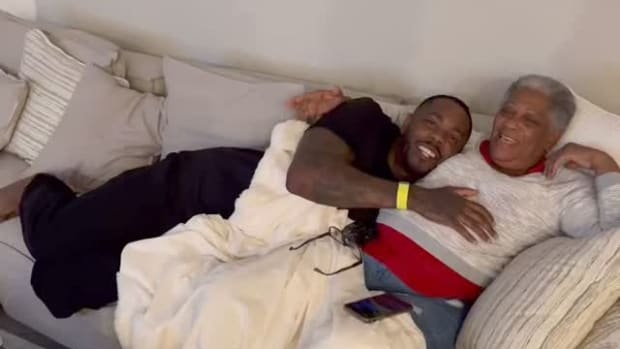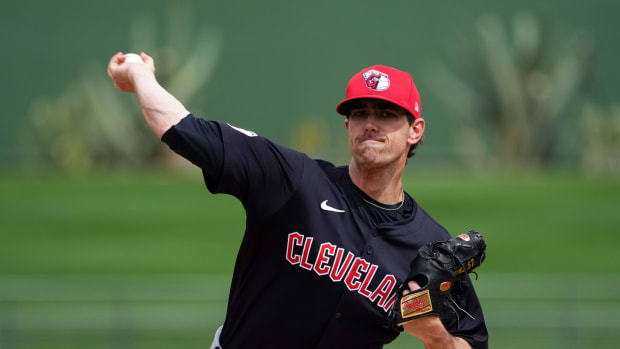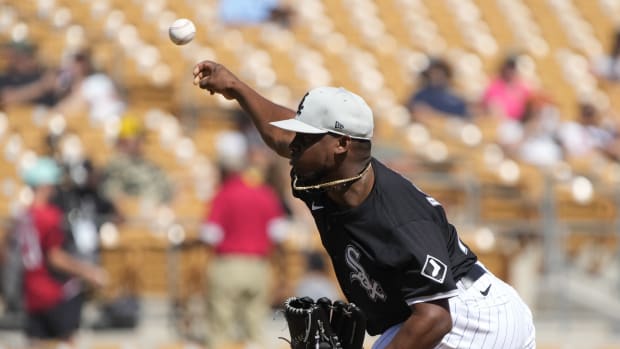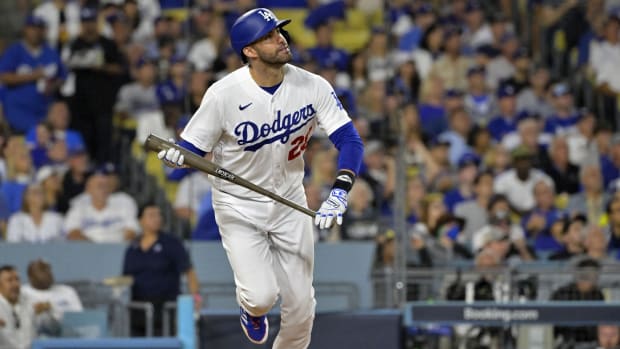The USA—Canada Friendship Series Proves Women’s Baseball Has a Promising Future
A city in northwestern Ontario was host to some of the most exciting baseball talent in North America two weeks ago. And none of the players were men.
In lieu of the Women’s Baseball World Cup qualifier held this year in Venezuela, the Canadian and U.S. women’s national teams arranged a five-game Friendship Series in Thunder Bay, Ontario from July 28 to Aug. 1. Team USA secured the series win, besting Canada three games to two.
“It’s something exceptional that these women are able to do,” says U.S. manager Veronica Alvarez. “Anybody that comes around these women is infected by the passion, and just pretty much falls in love with it.”
The profile of women in baseball has started to rise over the past several years: Alyssa Nakken became the first full-time woman coach in MLB history in 2020, Kim Ng became the first woman GM after being hired by the Marlins in November of that year, and Rachel Balkovec became the first woman to be a full-time manager of a major-league affiliated team earlier this year. In April, Kelsie Whitmore, who started all five games for the U.S. in Thunder Bay, signed with the Staten Island FerryHawks and became the first woman to play in the Atlantic League.
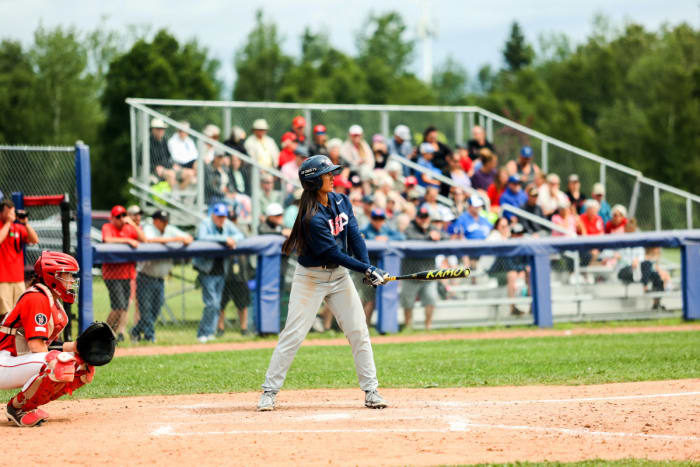
Whitmore, who in April became the first woman to play in the Atlantic League, is in her seventh year playing with the U.S. women’s baseball national team.
Courtesy of Lizzie Hattrich/Team USA
These women represent a long list of firsts, and they mark important incremental progress for one of the oldest boys clubs in sports. But this series also showed that the old boys club might not be the only way. Women’s baseball is a legitimate, competitive sport, with a future of its own. The entire weekend stood as proof that women can and do play baseball—not just softball—with and against each other. And they are very good at it.
Team USA and Team Canada are two of the most talented women’s baseball teams in the world, sitting neck-and-neck in international rankings. The World Baseball Softball Confederation establishes its rankings of national teams based on points accumulated by wins in international tournaments. While Japan, the six-time world champion, has run away with first place, less than 100 points separate Chinese Taipei in second, Canada in third and the U.S. in fourth. Canada won the bronze medal game in the last iteration of the Women’s Baseball World Cup in 2018, knocking the U.S. off the podium and into fourth place. The following year, though, at the World Cup qualifier in Mexico—the last time either team played internationally—the U.S. flattened Canada, 21–4.
This series was another chance to settle the score, and also for the countries to experience something other than intrasquad competition for the first time in three years.
“It was called a friendly series, and I think from game one, you just knew there wasn’t going to be anything friendly about it,” says Canada manager Ashley Stephenson. “Both teams really respect each other and so we find lots of players are even friends. But between the lines, for those few hours, it’s always healthy competition, and nobody wants to give an inch.”
The rivalry runs deep, even within the coaching staff. Both Stephenson and Alvarez were longtime members of their respective national teams before moving to coaching roles. They competed against each other as players in the 2015 Pan-Am Games, which was the first and, as of yet, only time that women’s baseball has appeared in a multi-sport international competition. (The U.S. beat Canada 11–2 in the gold medal game.)
Alvarez has been the U.S. manager since 2019. Stephenson, meanwhile, is in her first year as Canada’s manager after taking over for Aaron Myette, a former MLB pitcher who spent four years as Canada’s skipper but stepped away from the team earlier this year for personal reasons.
The past two weeks were a whirlwind for both teams, with the final rosters announced four days before the series began. The selection process for the U.S. started with an Open Trial in Minnesota on July 18. From there, 40 players were selected to the National Team Training Camp roster. They played intrasquad games at the Neiman Sports Complex and Target Field, the Twins’ home ballpark, to compete for the final 20 spots.
With women hailing from across the country, these weeks are one of the few times they all can train together as a group. Most balance baseball with full-time commitments to their careers or to school.
The final U.S. roster for the Friendship Series was a mix of 12 veterans and eight completely fresh faces to the program. Malaika Underwood and Anna Kimbrell made the team for the 11th and 10th time, respectively. Four other players had at least six years of experience.
One of those veterans is Whitmore, who was on Team USA for her seventh time this July. Whitmore, 24, is a two-way player who splits her time between the mound and the outfield for both the national team and the FerryHawks of the independent Atlantic League (often considered to be on the same level as many Double or Triple A teams).
“I couldn’t think of anybody better to be in that position representing women all across the world,” says Meggie Meidlinger, a right-handed pitcher/infielder and a six-time U.S. national team player. “She’s one of the most elite players out there, and she has an incredible work ethic and gives it her all. It’s just been so cool to see her live out her dream and be playing at that elite level.”
At first, Whitmore wasn’t sure if she would be able to make the trip to Canada for the Friendship Series because she is under a professional contract. Fortunately, the FerryHawks were on board, with their GM Gary Perone, manager Edgardo Alfonzo and pitching coach Nelson Figueroa giving her the O.K. to once again play for the national team, as she has done since her sophomore year of high school.
“It’s just one of the greatest feelings to come here with a bunch of other women that are playing this game,” says Whitmore. “I hear their stories, I hear what they’re going through or what they’re dealing with, what they’re accomplishing, and it's a great feeling to know that there's other women out there trying to do the same things.”
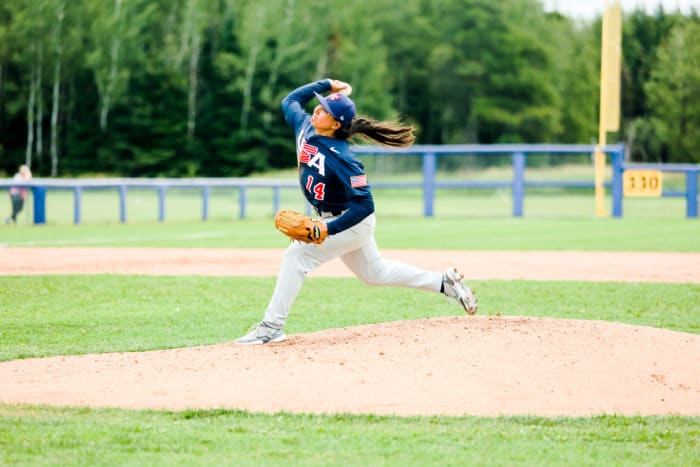
Whitmore is the Shohei Ohtani of the Atlantic League and the U.S. women’s baseball national team.
Courtesy of Lizzie Hattrich/Team USA
While she usually appears in relief for the FerryHawks, Whitmore got the starting job for the U.S. in the first game of the Friendship Series. In Team USA’s 16–2 opening victory, Whitmore went 4 2/3 innings and allowed zero runs on five hits. She provided her own run support, too—she went 3-for-3, had four RBIs, and was just a double shy of the cycle.
On the Canadian side, the roster was finalized following the Women’s Invitational Championship held at the end of July. Nine teams representing seven provinces traveled to Stonewall, Manitoba to play for the national title, which was selected at the conclusion of the tournament.
The season has been an emotional one for the Canadian team, competing for the first time since its captain, Amanda Asay, died in January at age 33 following a skiing accident. Asay had been a member of the team since 2005. In her honor, the Canadian players wore patches with her nickname, “Ace,” on their sleeves, and during practices all wore her number, 19, on the back of their jerseys. Before the opening game of the series, Asay’s parents joined the teams on the field for a moment of silence.
“She was kind of like our North Star that we follow,” Stephenson says.
Canada took a 1–0 lead in the second game before the U.S. rallied with eight hits and capitalized on four Canada errors to score seven unanswered runs and win the game. Down 0–2 in the series, Canada rebounded the next day, beating the U.S., 10–8. One of eight rookies playing for Canada, Julia Konigshofer picked up the win.
Team USA’s young talent also showed out on the mound over the weekend. On the fourth day, the Americans clinched the series, shutting out Canada 7–0. 18-year-old Jillian Albayati, a right-handed pitcher/infielder from Anaheim, threw five scoreless innings and struck out three.
“I love seeing all these younger players grow into their roles, and just seeing how far they’ve come,” Meidlinger says. “It’s been fun to see the growth, and it’s a very different change [from] when I was 18 years old, [my] first [year] on the team.”
The final game of the series was a rematch of the opener’s pitching duel between Whitmore and Canada’s Alli Schroder. At only 20 years old, Schroder, a righthander from Fruitvale, British Columbia, is already a veteran on the team. She has played with Canada since she was 16.
Schroder had a more limited role than usual during this year’s series—Canada’s trainers wouldn’t let her bat—because she was playing on a partially-torn MCL, an injury sustained at nationals the week prior. But in the final game, Schroder went six full innings, striking out five and allowing four runs in Canada’s 8–4 win.
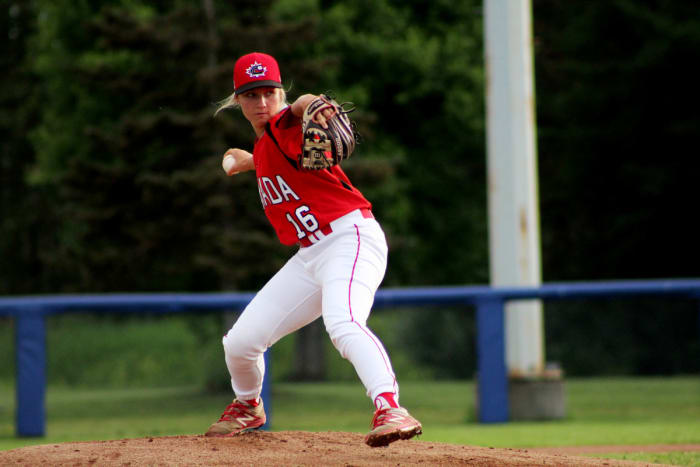
When Schroder isn’t playing for Team Canada, she works as a forest firefighter and is a student at Vancouver Island University, where she pitches for the men’s baseball team.
Courtesy of Adam Morissette/Team Canada
Last year, Schroder became the first woman to pitch in the Canadian College Baseball Conference, after she joined the Vancouver Island University men’s baseball team. Off the diamond, she works fighting forest fires in her home province and has to find ways to fit training around her work schedule.
“I work in 14-day shifts, two days off. When I get shipped up, I know I need to have a baseball and a glove with me,” Schroder says. “Training quite literally looks like going to find a fence, going to find a brick wall at a fire camp, and throwing a baseball against it, doing what I can.”
Both teams left Thunder Bay with some positive takeaways. The U.S. won the series and outscored Canada 42–21 through five games, but Canada’s closing win proved that it is still right there with the U.S. and that the rivalry isn’t going away. Both countries have set their sights on the next Women’s Baseball World Cup, planned for 2024. Awaiting them there will likely be a rematch, as well as an encounter with another foe, the perennial champion Japan.
Beyond rankings and world cups, both Team USA and Team Canada have another goal: to get more people’s eyes on their sport on the international stage. Women’s baseball is played in 20 countries, but since the 2015 Pan-Am Games, there hasn’t been an opportunity to see it played in a multi-sport international competition. The ultimate dream would be the inclusion of women’s baseball in the Olympics. A stage of that significance would show the entire world that there is a thriving community of women that exists in what so long has been considered a man’s game.
Athletes like Whitmore or Schroder, and the several members of Team USA who play NCAA men’s baseball, are proving that women can play this game even alongside men. But it can be tiring to always be the first, or always be the only. A woman in a men’s league is often perceived first as her gender, and second as a baseball player. These national programs provide women with teams of their own—if they stand out in the crowd, it’s by virtue of their talent, not by the ponytail under their cap.
“It’s awesome being in a community full of women, ballplayers that are female,” Whitmore says. “It’s definitely something that makes this game worth playing for.”
More Baseball Coverage:
• The ‘Field of Dreams’ Game Deserves to Be an MLB Tradition
• Is Patrick Corbin Having the Worst Pitching Season Ever?
• The White Sox Are Sleeping Away Their Once Promising Season
• A Cautiously Optimistic Cody Bellinger Update
• The Beautiful Life of Vin Scully






























